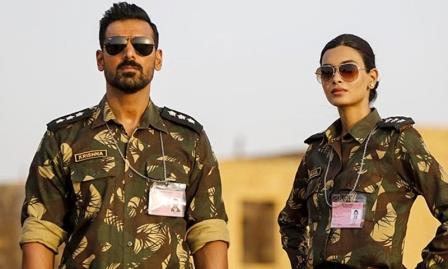Music: Sachin-Jigar and Jeet Gannguli
Lyrics: Vayu, Kumar Vishwas, Rashmi Virag and Sachin Sanghvi
Singers: Divya Kumar, Keerthi Sagathia, Jyotica Tangri, Yasser Desai and Arijit Singh
Audio On: Zee Music Company Number of Songs: 6
Album Released on: 15 May 2018
A film made on the nuclear bomb test explosions cannot be expected to have a wholesome music album. Then, you see Sachin-Jigar being credited as the music directors and the album having as many as six songs and your expectations take a rise. Though most of the tracks have not been used in the film, Zee Music Company/Zee Studio which has co-produced ‘Parmanu The Story Of Pokhran’have made sure that the listeners get a good album from a film that is far from being a musical.
‘Shubh Din’, which roughly translates to the auspicious day, sets the tone for the album as it not only reflects the sound of the milieu the film is set in (Rajasthan), it also emphasises the importance of the arrival of the day or time when India is going to take its first step towards becoming a nuclear power. Jyotica Tangri and Keerthi Sagathia complement each other’s voices very well in this highly infectious track where the composers (Sachin-Jigar) and the lyricist (Vayu) are in a very good form.
Guest composer Jeet Gannguli pitches in with “Jitni Dafa”, a soft, romantic number which, despite being melodious and appealing to the ears, sounds like a generic romantic number. It must be one of those tracks which was lying with the record label and was added at the last minute in the film’s soundtrack as they thought a romantic track could serve as a good promotional material for a film of this nature. Though it is far from being a bad track, it reminds one of several average sons composed by Gannguli in the past.
Sachin-Jigar create a nice concoction of Rajasthani folk music and a percussion heavy sound that lends a patriotic fervour to “Thare Vaaste”. The song has energy, melody and a really good orchestral good structure. The hook line, especially, is quite addictive. Divya Kumar lends the requisite earthiness to the song apart from being responsible for the high-octane energy the song has. Though the song has some Rajasthani words thrown in for good effect, the lyrics (Vayu) are simple enough to be comprehended by the average listener.
Divya Kumar’s voice is heard again in quick succession with “Kasumbi” arriving on the scene. This one, too, has a quintessential Rajasthani folk music touch to it. “Kasumbi” has an aggressive tone to it and brings to the fore a sense of masculinity along with a wave of patriotic fervour with it. Divya, as always, brings a vast amount of energy along with him and adds great value to the track as a vocalist. Vayu’s lyrics are quite praiseworthy too.
Sachin Sanghvi, one half of Sachin-Jigar picks up the pen and writes “Sapna”, a soothing lullaby-like melody sung by Arijit Singh. The song sounds extremely pleasant. The backgrounds are quite good too; a part of them (the humming) reminds one of a similar music piece in “Maana Ke Hum Yaar Nahin” (‘Meri Pyaari Bindu’), which was composed by Sachin-Jigar themselves. This is the kind of song you would like to play on a loop after you come back from and unwind.
Kumar Vishwas, a prominent political figure and a noted poet, writes “De De Jagah”, song that has a subtle devotional touch to it. The orchestral arrangements are a good mix of strings, tabla and pads. Yasser Desai does fairly well as a vocalist but one feel his voice was perhaps not the right fit for this song. Sachin-Jigar’s tune is soothing and catchy at the same time. Kumaar Vishwas’s lyrics are simple but resplendent with some smart wordplay.
‘Parmanu The Story Of Pokhran’ has a very good album even though most of the songs have not been used in the film. The songs, definitely, deserved better promotion. It is good to see Sachin-Jigar deliver quality music so consistently.

